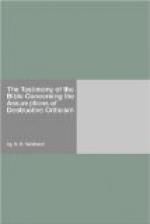Here are twenty-five positive statements that God spake to Moses, or commanded Moses. Does language mean anything? Is there any escape from the truth, except by a denial of the entire Word of God?
God and Moses are the active agents in every chapter in the book of Leviticus. And this fact is definitely stated in the last verse of Leviticus: “These are the commandments which the Lord commanded Moses.”
You might as well attempt to blot the sun from the heavens at high noon as to eliminate from the book of Leviticus the one great and divinely-appointed personality, Moses, the lawgiver, the leader the actor, and under God the author of the book.
A further word concerning the date of Leviticus. When was it written? As already stated, the critics place the time of the writing after the exile, between nine hundred and one thousand years after the decease of Moses. Something additional should be added to what has already been said on the subject.
The reader of the English Bible will see that Leviticus immediately follows Exodus by the connective “and.” The same Hebrew connective unites Exodus with Genesis, and Numbers with Leviticus. The natural, grammatical, and logical inference is, that the author of Genesis is the author of Exodus, Leviticus, and Numbers.
In addition to this fact we have the testimony of some of the prophets who lived before the exile, that they were familiar with what the critics call “the priestly code,” which is elaborated in Leviticus.
Professor Stanley Leathes adduces forty-five allusions to the books of Moses in the book of Amos. (See Bible Student and Teacher, October, 1906.) Amos’ prophetic work was “in the northern kingdom, between 807 and 765 B.C., during the reign of Jeroboam II, when the kingdom of Israel was at the height of its splendor.” (See Schaff-Herzog, Enc. Art. Amos.) This was more than two hundred years before the restoration from the exile, long before the captivity, which the critics designate as the beginning of the literary period.
Professor Leathes affirms that “there is apparent acquaintance with and reference to each book of the Pentateuch in this prophecy.” He shows that Leviticus is referred to in nine passages in Amos. The reference in Amos iv. 5 to “a sacrifice in thanksgiving with leaven” is an allusion to the law of thanksgiving in Lev. vii. 13.
In giving God’s message to Israel in a time of great backsliding, Amos said to them: “Though ye offer unto me burnt offerings and meat offerings, I will not accept them, neither will I regard the peace offerings of your fat beasts.” (Amos v. 23.)
This is an allusion to the law of burnt offerings and meat offerings set forth in the first chapter of Leviticus. But the critics inform us that there was no law concerning these offerings until several hundred years after Amos ceased to prophesy!
Again, enumerating the sins of the people, Amos charges them with giving the Nazarites wine to drink. “Ye gave the Nazarites wine to drink, and commanded the prophets, saying, Prophesy not.” (Amos ii. 12.) This was a violation of the law of God as found in Num. vi. 2, 3, showing at least that the Pentateuch, of which Leviticus is an important part, was known to Amos, long before the period to which Leviticus has been assigned by the destructive critics.




